Maye Surname Ancestry ResultsOur indexes 1000-1999 include entries for the spelling 'maye'. In the period you have requested, we have the following 93 records (displaying 51 to 60): Single Surname Subscription | | | Buying all 93 results of this search individually would cost £444.00. But you can have free access to all 93 records for a year, to view, to save and print, for £100. Save £344.00. More... |
These sample scans are from the original record. You will get scans of the full pages or articles where the surname you searched for has been found. Your web browser may prevent the sample windows from opening; in this case please change your browser settings to allow pop-up windows from this site. Wiltshire freeholders
(1625-1645)
Inquisitions post mortem were held after the death of freeholders who held their estates in capite or in chief, i. e., directly from the crown. The inquisition, held by the royal escheator upon the oath of jurors from the county who were also normally freeholders, recorded what estates the deceased had held, by what tenure, what they were worth, the date of death, who was the next heir, and whether the heir was of age. The sample scan shows an unusually brief inquisition: these abstracts usually run to two or three pages of print. MAYE. Cost: £4.00.  | Sample scan, click to enlarge
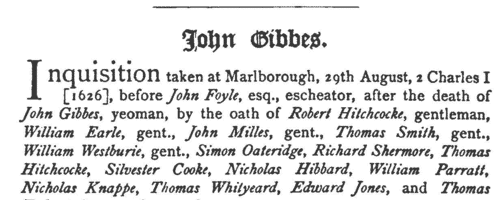
| PCC Probates and Administrations
(1647)
The Prerogative Court of Canterbury's main jurisdiction was central and southern England and Wales, as well as over sailors &c dying abroad: these brief abstracts, compiled under the title "Year Books of Probates", and printed in 1906, usually give address, date of probate and name of executor or administrator. They are based on the Probate Act Books, cross-checked with the original wills, from which additional details are, occasionally, added. The original spelling of surnames was retained, but christian and place names have been modernised where necessary.MAYE. Cost: £2.00.  | Sample scan, click to enlarge
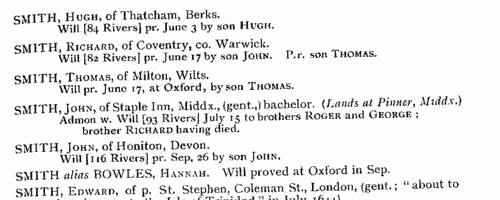
| Colonists and adventurers
(1610-1660)
During this period, the English crown issued charters to companies of adventurers and individual proprietors to establish settlements in Acadia (Nova Scotia), Africa, Amazon, Anguilla, Antigua, Association (Tortuga), Bahamas, Barbadoes, Barbuda, Bermudas (Somers Islands), Canada, Cape Gratia de Dios, Carolina, Bay of Darien, Delaware Bay, Deseada, Dominica, Eleuthera, Enegada, Fernando de Noronho, Floria, Fonseca, Grenada, Guadaloupe, Guiana, Guinea, Henrietta, Jamaica, Long Island, Maine, Marigalante, Maryland, Metalina, Montserrat, Narrangansetts Bay, Nevis, New England (New Plymouth, Massachusetts, Connecticut and New Haven), Newfoundland, New Hampshire, New York, Nova Scotia, Providence Island, Quebec, Redendo, Rhode Island, St Bartholomew, St Brandon, St Christopher's, St Eustache, St Lucia, St Martin, St Vincent, Sembrera, Surinam, Tadousac, Tobago, Todosantes, Trinidad and Virginia. The central archive relating to these ventures up to 1688 amounted to 71 volumes of correspondence, plus 109 entry books containing entries of letters sent to the colonies, of charters, commissions and instructions, minutes and proceedings of the companies and proprietaries that in the first instance governed several of the colonies, journals of the Board of Trade, &c. This archive, called the State Papers, Colonial Series, at the Public Record Office, was calendared for the period through to 1660 by W. Noel Sainsbury, and published in 1860. The first few pages include material as early as 1574, but the bulk of the volume is from 1610 to 1660, and that is indexed here.MAYE. Cost: £4.00.  | Sample scan, click to enlarge
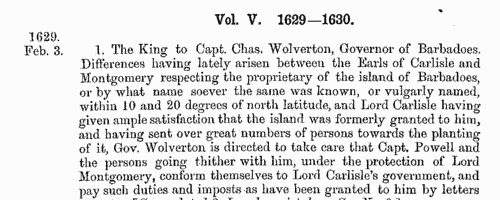
| London Marriage Allegations
(1611-1660)
London, Essex and part of Hertfordshire lay within the diocese of London. In the later 17th century the individual archdeaconry courts issued marriage licences, but for this period the only surviving material is from the overarching London Consistory court. The main series of marriage allegations from the consistory court was extracted by Colonel Joseph Lemuel Chester, and the text was edited by George J. Armytage and published by the Harleian Society in 1887. A typical later entry will give date; name, address and occupation of groom; name, address and condition of his intended bride, and/or, where she is a spinster, her father's name, address and occupation. Lastly we have the name of the church where the wedding was going to take place. For the later years Colonel Chester merely picked out items that he thought were of interest, and his selections continue as late as 1828, but the bulk of the licences abstracted here are from the 17th century.MAYE. Cost: £4.00.  | Sample scan, click to enlarge

| Surrey Sessions
(1661-1663)
Surrey Sessions Rolls and Order Books. These are abstracts of sessional orders, minutes of criminal cases, memoranda and other entries of record taken from the Order Books from October 1661 to January 1663, inclusive, and the Sessions Rolls for October 1661, January 1662, April 1662, July 1662, October 1662 and January 1663.MAYE. Cost: £4.00.  | Sample scan, click to enlarge

| Inhabitants of Reading in Berkshire
(1550-1667)
The borough of Reading in Berkshire comprised three ancient parishes - St Giles, St Lawrence and St Mary. The churchwardens' accounts of Reading St Mary from 1550 to 1667 were transcribed by Francis N. A. Garry and A. G. Garry and published in 1893. The accounts, usually signed off by the two churchwardens and two surveyors of the highways for the year, listed the income and expenditure of the church. Income included annual payments for seats in the pews; rents from church property; fees for the use of the pall and for tolling the knell (knill) at funerals, and for opening graves; and sums received for 'gatherings', i. e. money gathered from communicants at Easter, Hocktide, Mayday, Hallowmas, Christmas and Whit. Expenditure was largely on maintaining the church fabric, and paying the minor officials - most of the names found on this side of the account are of local workmen busy with repairs.MAYE. Cost: £4.00.  | Sample scan, click to enlarge
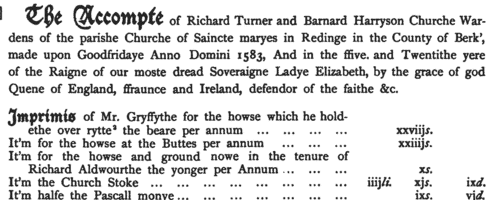
| Allegations for marriages in southern England
(1660-1679)
The province or archbishopric of Canterbury covered all England and Wales except for the northern counties in the four dioceses of the archbishopric of York (York, Durham, Chester and Carlisle). Marriage licences were generally issued by the local dioceses, but above them was the jurisdiction of the archbishop, exercised through his vicar-general. Where the prospective bride and groom were from different dioceses it would be expected that they obtain a licence from the archbishop; in practice, the archbishop residing at Lambeth, and the actual offices of the province being in London, which was itself split into myriad ecclesiastical jurisdictions, and spilled into adjoining dioceses, this facility was particularly resorted to by couples from London and the home counties, although there are quite a few entries referring to parties from further afield. The abstracts of the allegations given here usually state name, address (street in London, or parish), age, and condition of bride and groom; and sometimes the name, address and occupation of the friend or relative filing the allegation. Where parental consent was necessary, a mother's or father's name may be given. The ages shown should be treated with caution; ages above 21 tended to be reduced, doubtless for cosmetic reasons; ages under 21 tended to be increased, particularly to avoid requiring parental consent; a simple statement 'aged 21' may merely mean 'of full age' and indicate any age from 21 upwards. These are merely allegations to obtain licences; although nearly all will have resulted in the issuing of the licence, many licences did not then result in marriage. This index also includes marriage licence allegations for the jurisdiction of the Dean and Chapter of Westminster, 1558 to 1699.MAYE. Cost: £4.00.  | Sample scan, click to enlarge

| Hertfordshire Sessions
(1581-1700)
Incidents from the Hertfordshire Sessions Rolls. These cover a wide range of criminal and civil business for the county, with presentments, petitions, and recognizances to appear as witnesses: many of the records concern the county authorities dealing with regulation of alehouses, religious conventicles, absence from church, highways, poaching, profanation of the Sabbath, exercising trades without due apprenticeship &c. Unlike the Sessions Books, the decisions of the justices are not recorded on the rolls, which serve more as a record of evidence and allegations. Where the date of a roll is given with an asterisk, it indicates that that particular document was not then in the county muniments, but in the archives of the Marquess of Salisbury (whose ancestors had served as Custos Rotulorum) at Hatfield House. This is a calendar of abstracts of extracts: it is by no means a completely comprehensive record of the surviving Hertfordshire sessions rolls of the period, but coverage is good. MAYE. Cost: £4.00.  | Sample scan, click to enlarge

| Wandsworth Burials
(1727)
The ancient parish of Wandsworth in Surrey comprised the single township of Wandsworth, including the hamlets of Garratt, Half Farthing and Summers Town. It lay in the archdeaconry of Surrey of the diocese of Winchester: unfortunately, few bishop's transcripts of Surrey parish registers survive earlier than 1800. Although the original parish registers of Wandsworth doubtless commenced in 1538, the volume(s) before 1603 had been lost by the 19th century. In 1889 a careful transcript by John Traviss Squire of the first three surviving registers was printed, and we have now indexed it year by year. The early burial registers contain little detail - date of burial, and full name. For the burial of children, the father's name is also stated; for the burial of wives, the husband's. Such details as date or cause of death, age, address or occupation are almost never given. The burial registers are considerably more bulky than the baptism registers, because the burying ground was used by Dissenters, who formed a large part of the population. These include a French Protestant congregation that worshipped in a church (the registers of which do not survive) in a courtyard immediately opposite the parish church. The Quakers had a cemetery of their own.MAYE. Cost: £4.00.  | Sample scan, click to enlarge
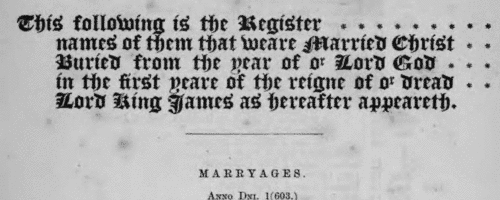
|  Apprentices registered in Devon
(1741-1745) Apprentices registered in Devon
(1741-1745)
Apprenticeship indentures and clerks' articles were subject to a 6d or 12d per pound stamp duty: the registers of the payments usually give the master's trade, address, and occupation, and the apprentice's father's name and address, as well as details of the date and length of the apprenticeship. There are central registers for collections of the stamp duty in London, as well as returns from collectors in the provinces. These collectors generally received duty just from their own county, but sometimes from further afield. (The sample entry shown on this scan is taken from a Norfolk return)MAYE. Cost: £8.00.  | Sample scan, click to enlarge

|
Research your ancestry, family history, genealogy and one-name study by direct access to original records and archives indexed by surname.
|













